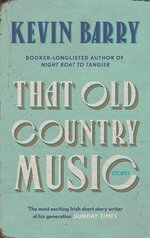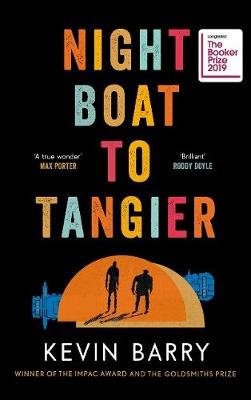Kevin Barry, Dark Lies the Island (2012)
 In the title story of Kevin Barry’s second collection, the protagonist Sara has travelled to the edge of Clew Bay, County Mayo, which seems to her father quite a desolate spot to be heading in October. Ostensibly, Sara has gone there to work on some art projects during her year out; but it is soon clear that she is at Clew Bay to get away from it all, in the most final sense. Sara’s human contact is largely limited to the other members of an internet forum accessed on her holiday home’s creaky dial-up; for the rest of the time, it’s just the landscape of Clew Bay and the inside of Sara’s own head, ‘the itch of her blood as it sped’. ‘Dark Lies the Island’ is an intensely discomfiting piece that ends with an ambiguity, perhaps a fragile hope.
In the title story of Kevin Barry’s second collection, the protagonist Sara has travelled to the edge of Clew Bay, County Mayo, which seems to her father quite a desolate spot to be heading in October. Ostensibly, Sara has gone there to work on some art projects during her year out; but it is soon clear that she is at Clew Bay to get away from it all, in the most final sense. Sara’s human contact is largely limited to the other members of an internet forum accessed on her holiday home’s creaky dial-up; for the rest of the time, it’s just the landscape of Clew Bay and the inside of Sara’s own head, ‘the itch of her blood as it sped’. ‘Dark Lies the Island’ is an intensely discomfiting piece that ends with an ambiguity, perhaps a fragile hope.
So I’ve headed this review with a quotation which refers to life beginning, then I immediately launch into talking about a story that hovers on the verge of death. But that is both the breadth of life which Barry fits into his stories, and that there’s always a sense within them that life carries on, bringing with it variously hope and melancholy. In a few pages, ‘Across the Rooftops’ brilliantly captures the uncertainty of youthful attraction, as its student narrator tries to read the signs of the girl he’s with, waiting for the right moment to make a move that could take their journey of the last few months to its next stage, or end it altogether. The men in ‘Beer Trip to Llandudno’ have all been hurt or damaged in some way; and what seems at first like a jolly outing to sample some pubs may actually be the only thing holding these men together. Whatever happens, there’ll always be another pub to try, and the possibility of a fine ale.
This is one of Barry’s common techniques: to show how his characters use external events as a shield or distraction from what is happening deeper inside. ‘Wifey Redux’ begins with its narrator. Jonathan, describing his fairytale marriage to his school sweetheart, Saoirse – but he has already warned us that the tale will end with his being arrested. And, sure enough, cracks begin to show in the couple’s relationship as their daughter Ellie grows up, becoming the image of her mother as she was. Jonathan takes a dislike to Ellie’s new boyfriend, and is increasingly uncomfortable with the thought of his daughter doing the same sorts of things that he and Saoirse did at her age. As we come to see, though, Jonathan is not so much protecting Ellie’s honour as he is trying to reassert himself when he feels that what he had – what he was – is slipping from his grasp.
Some of the tales in Dark Lies the Island shift the general tone of the collection quite effectively. ‘Ernestine and Kit’ starts off as a whimsical road-trip taken by two chatty old women, but gradually turns more sinister, as Barry ups the ante more than once. Then there are the stories where Barry’s humour – often a subtle undercurrent – comes strongly to the fore: ‘Berlin Arkonaplatz – My Lesbian Summer’ sees 21-year-old Patrick spend an odyssey of a summer with the fabulous Silvija (‘By her own reckoning, Silvija was at this time the most brilliant fashion photographer in all of Berlin. This didn’t mean that she got paid’). The narrator of ‘Fjord of Killary’ bought a hotel which came with idiosyncratic locals (‘The primary interest of these people’s lives, it often seemed, was how far one place was from another, and how long it might take to complete the journey, given the state of the roads’), and is now coming to the end of his tether. For Patrick, the summer is – of course – too wonderful to last; but something happens which allows the hotelier to find his feet once more. There’s life moving on again, bringing or ending joy.
This book has been shortlisted for the 2013 Edge Hill Short Story Prize. Click here to read my other posts on the shortlist.
(Elsewhere: see what RobAroundBooks and Valerie O’Riordan (writing for Bookmunch) had to say about Dark Lies the Island.)
Like this:
Like Loading...


 In the title story of Kevin Barry’s second collection, the protagonist Sara has travelled to the edge of Clew Bay, County Mayo, which seems to her father quite a desolate spot to be heading in October. Ostensibly, Sara has gone there to work on some art projects during her year out; but it is soon clear that she is at Clew Bay to get away from it all, in the most final sense. Sara’s human contact is largely limited to the other members of an internet forum accessed on her holiday home’s creaky dial-up; for the rest of the time, it’s just the landscape of Clew Bay and the inside of Sara’s own head, ‘the itch of her blood as it sped’. ‘Dark Lies the Island’ is an intensely discomfiting piece that ends with an ambiguity, perhaps a fragile hope.
In the title story of Kevin Barry’s second collection, the protagonist Sara has travelled to the edge of Clew Bay, County Mayo, which seems to her father quite a desolate spot to be heading in October. Ostensibly, Sara has gone there to work on some art projects during her year out; but it is soon clear that she is at Clew Bay to get away from it all, in the most final sense. Sara’s human contact is largely limited to the other members of an internet forum accessed on her holiday home’s creaky dial-up; for the rest of the time, it’s just the landscape of Clew Bay and the inside of Sara’s own head, ‘the itch of her blood as it sped’. ‘Dark Lies the Island’ is an intensely discomfiting piece that ends with an ambiguity, perhaps a fragile hope.
Recent Comments